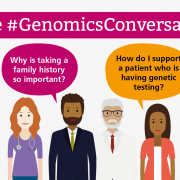Genomics debated at the RCGP annual conference
Lively discussion around genomics in primary care at leading GP event
On Thursday 12th and Friday 13th October the Genomics Education Programme (GEP) joined forces with HEE’s Primary Care team to host a joint stand at the Royal College of General Practitioners (RCGP) annual conference in Liverpool. Over the two days, both teams had many positive conversations with GPs and other healthcare professionals.
During the conference, an online survey developed by the University of Nottingham in collaboration with the GEP and RCGP was launched. Aimed at practising GPs, the survey aims to identify how and where GPs access information about genomic medicine during patient consultations. The online survey is still open for responses.
Genomics debate
Genomics also featured in day one of the conference programme, with the motion: ‘This house believes that UK primary care should be an early adopter of genomic medicine.’
GEP partner Dr Imran Rafi took part in the debate, which was also attended by genomics education GP Advisor Dr Judith Hayward. Other leading figures, including RCGP ethics committee chair Professor Simon Gregory and author Donna Dickenson, provided inspirational and wide-ranging perspectives, and the floor responded with a lively discussion and debate.
The argument for
The session began with the promise and opportunity of genomic medicine in primary care, its potential in relation to cancer and other common complex disease, as well as rare disease and infectious disease, while also recognising the need for educational provision and informatics development. Genomic medicine is arguably driven by technological advance, and – the speakers emphasised – primary care practitioners have a duty to influence the direction of travel to ensure clinical utility and benefit for patients.
The argument against
The group were then challenged to consider patient autonomy, whether genomics will truly enhance or restrict patient choice, whether treatments would be denied to those who would still respond even if to a lesser degree, and to consider potentially negative outcomes such as increasing fear and anxiety. From the societal perspective, there is a responsibility to prove cost-effectiveness and consider resource allocation; would this be by need or successful outcome? Would genomic medicine contribute to relentless medicalisation of society?
The verdict
The motion was found against; however, the floor indicated that primary care practitioners should be adopters and early ‘responders’: influencing the direction of research and technological advance in order to realise the benefit for patients, but only adopt genomic medicine once we can fully understand the implications and have the necessary tools to ensure it is truly at a deliverable stage.
You can find more details about the conference and a review of all the speeches on the conference website.









